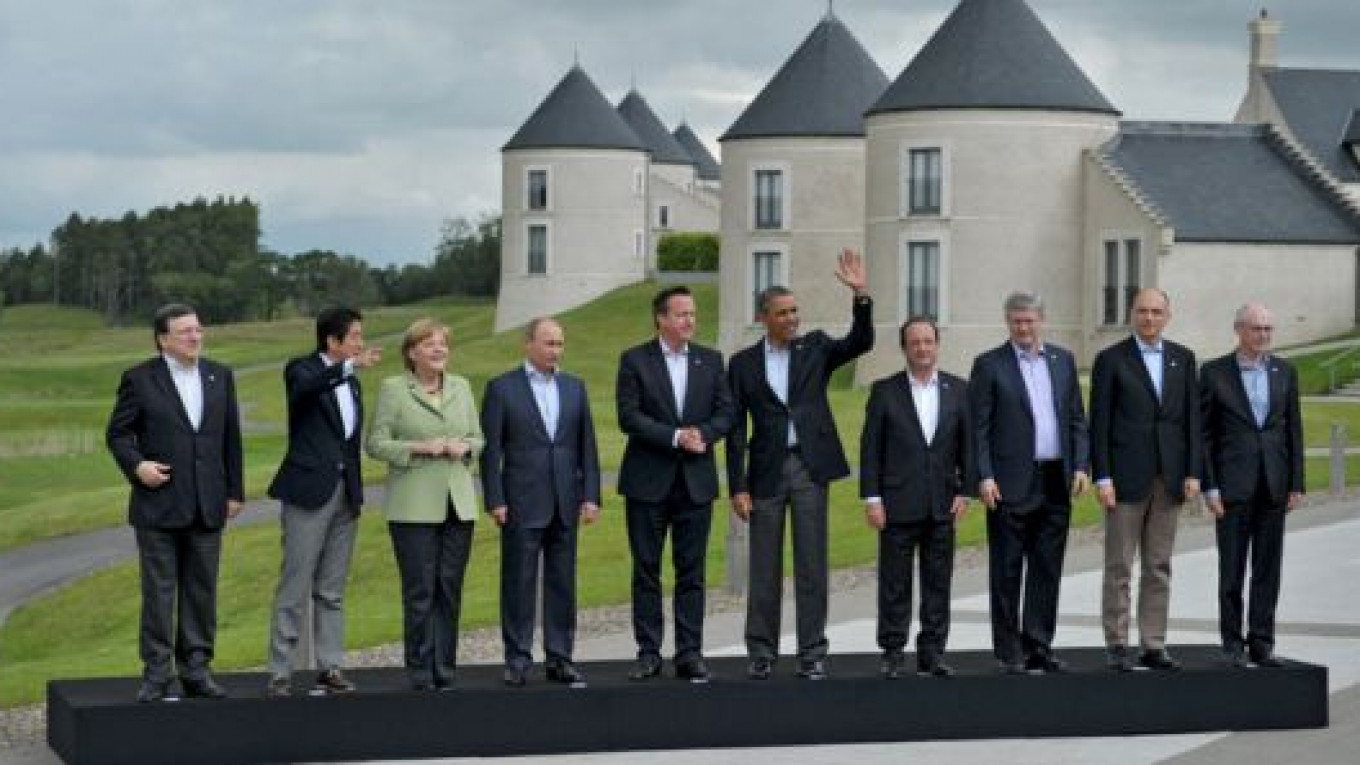Russia's presidency of the Group of Eight this year will focus on transparency and efficiency in the fight against terrorism and elimination of protectionist barriers in trade, President Vladimir Putin said.
In an address published on the Kremlin's website as Russia assumed the presidency on New Year's Day, Putin preached cooperation, dialogue and shared responsibility in achieving the group's goals and advocated "a spirit of partnership based on trust" among its members- the U.S., UK, Germany, Italy, France, Japan, Canada, European Union and Russia.
Putin rejected the view of the G8 as "an elite club of world leaders who discuss the destiny of humanity behind closed doors," appealing to "efficiency" and "transparency" instead.
Issues topping the agenda this year will be the fight against drugs, combating terrorism and extremism and "settling local conflicts," he said.
Putin did not specify which local conflicts he intended to address. But the wave of terror that Russia faces stems from the country's main "local conflict" of the past two decades- what was once a war against separatists in Chechnya has spawned Islamic extremism throughout the North Caucasus and beyond.
In a remark highlighted on Russia's G8 presidency website, Ariel Cohen, a political analyst at the Heritage Foundation in Washington, said that combating terrorism is likely to be high on Russia's list of priorities for the G8 in the next 12 months.
The threat of terrorism, underscored by two deadly bombings in Volgograd on Dec. 29 and Dec. 30, has cast doubt on Russia's ability to ensure security at the 2014 Olympic Games in Sochi — the same city where Russia is also scheduled to host a G8 summit in June.
A few months before the Volgograd bombings, the Chechen leader of the terrorist group Caucasus Emirate, Doku Umarov, called on his supporters to do everything they can to disrupt Sochi Games.
Russia's agenda will also include preventing natural and technological disasters, ensuring economic growth and "eliminating protectionist barriers in trade and investment," Putin said.
He made the comments even while his country emerged as the world's leader in protectionism last year according to a recent study by Global Trade Alert, a leading independent trade monitoring service.
The study said Russia enacted more protectionist trade measures in 2013 than any other country. Furthermore, together with its partners in the Customs Union – Belarus and Kazakhstan – Russia also accounted for one-third of all of the world's protectionist steps last year.
Russia finds itself in a "unique position", Marina Larionova, GG10 member and Co-Chair of the Civil20, said. It chaired the G20 in 2013, will lead the G8 this year and the BRICS group- Brazil, Russia, China, India and South Africa- in 2015.
"The sequence of three presidencies presents a rare opportunity for coordination, reinforcement and division of labor in setting the agenda and defining presidency priorities across the three forums," she said in a paper published on the GG10 website.
During his annual news conference in December Putin said Russia's presidency of the G8 would largely be "based on the continuity with the previous host country's agenda."
That agenda, set by Prime Minister David Cameron, focused mainly on economic development by advancing trade, ensuring tax compliance and promoting greater transparency.
Russia last held the presidency of the G8 in 2006.
A Message from The Moscow Times:
Dear readers,
We are facing unprecedented challenges. Russia's Prosecutor General's Office has designated The Moscow Times as an "undesirable" organization, criminalizing our work and putting our staff at risk of prosecution. This follows our earlier unjust labeling as a "foreign agent."
These actions are direct attempts to silence independent journalism in Russia. The authorities claim our work "discredits the decisions of the Russian leadership." We see things differently: we strive to provide accurate, unbiased reporting on Russia.
We, the journalists of The Moscow Times, refuse to be silenced. But to continue our work, we need your help.
Your support, no matter how small, makes a world of difference. If you can, please support us monthly starting from just $2. It's quick to set up, and every contribution makes a significant impact.
By supporting The Moscow Times, you're defending open, independent journalism in the face of repression. Thank you for standing with us.
Remind me later.


